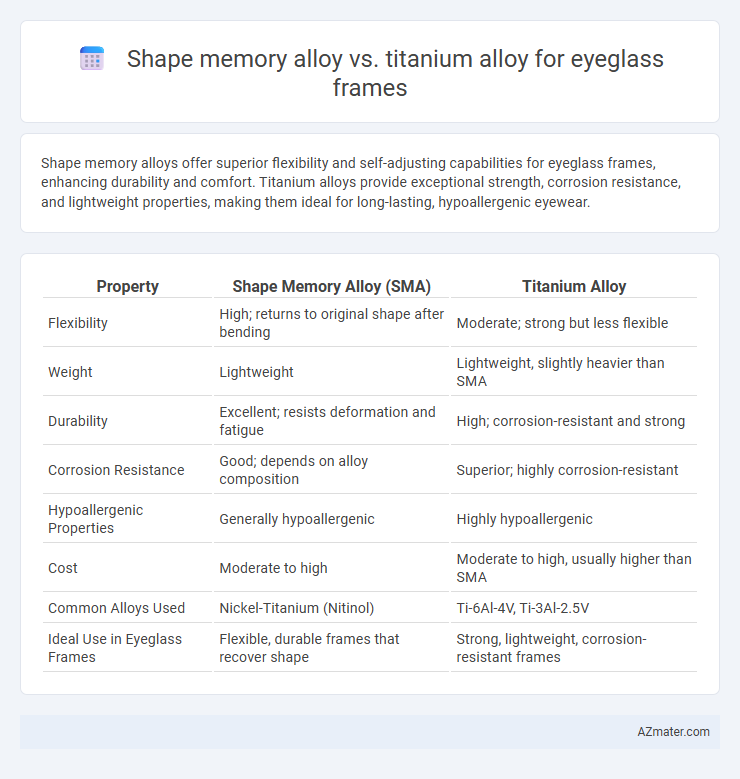Shape memory alloys offer superior flexibility and self-adjusting capabilities for eyeglass frames, enhancing durability and comfort. Titanium alloys provide exceptional strength, corrosion resistance, and lightweight properties, making them ideal for long-lasting, hypoallergenic eyewear.
Table of Comparison
| Property | Shape Memory Alloy (SMA) | Titanium Alloy |
|---|---|---|
| Flexibility | High; returns to original shape after bending | Moderate; strong but less flexible |
| Weight | Lightweight | Lightweight, slightly heavier than SMA |
| Durability | Excellent; resists deformation and fatigue | High; corrosion-resistant and strong |
| Corrosion Resistance | Good; depends on alloy composition | Superior; highly corrosion-resistant |
| Hypoallergenic Properties | Generally hypoallergenic | Highly hypoallergenic |
| Cost | Moderate to high | Moderate to high, usually higher than SMA |
| Common Alloys Used | Nickel-Titanium (Nitinol) | Ti-6Al-4V, Ti-3Al-2.5V |
| Ideal Use in Eyeglass Frames | Flexible, durable frames that recover shape | Strong, lightweight, corrosion-resistant frames |
Introduction to Eyeglass Frame Materials
Shape memory alloys, such as nickel-titanium (Nitinol), offer exceptional flexibility and the ability to return to their original shape after bending, making them ideal for durable and lightweight eyeglass frames. Titanium alloys provide high strength-to-weight ratios, corrosion resistance, and hypoallergenic properties, ensuring long-lasting comfort and structural integrity. Both materials cater to different consumer needs with shape memory alloys prioritizing resilience and titanium alloys focusing on premium strength and biocompatibility.
Overview of Shape Memory Alloys
Shape memory alloys (SMAs), primarily composed of nickel-titanium (Nitinol), exhibit unique properties such as superelasticity and the ability to return to their original shape after deformation, making them ideal for eyeglass frames that require flexibility and durability. Compared to titanium alloys, SMAs offer enhanced resilience to bending and twisting, reducing the likelihood of permanent damage or breakage. This exceptional shape recovery, combined with corrosion resistance and biocompatibility, positions SMAs as a superior choice for lightweight, adaptable eyewear designs.
Key Properties of Titanium Alloys
Titanium alloys offer exceptional strength-to-weight ratio, corrosion resistance, and biocompatibility, making them ideal for durable and lightweight eyeglass frames. Their high fatigue resistance ensures long-lasting flexibility and shape retention under stress. Unlike shape memory alloys, titanium alloys do not exhibit superelasticity but provide superior structural stability and hypoallergenic properties.
Flexibility and Durability Comparison
Shape memory alloys, such as nickel-titanium (Nitinol), offer exceptional flexibility and the ability to return to their original shape after bending, making them highly resistant to deformation and ideal for eyeglass frames that endure frequent handling. Titanium alloys provide superior durability with excellent strength-to-weight ratio and corrosion resistance but lack the superelastic properties of shape memory alloys, resulting in less flexibility under stress. For eyewear applications, shape memory alloys enhance resilience against bending and twisting, while titanium alloys deliver long-lasting structural integrity and minimal weight.
Weight and Comfort Differences
Shape memory alloys offer exceptional flexibility and lightweight properties, making eyeglass frames more comfortable for extended wear. Titanium alloys provide superior strength and durability while maintaining a low weight, resulting in sturdy yet lightweight frames. The weight difference between the two materials typically favors shape memory alloys for ultra-lightweight comfort, whereas titanium alloys excel in balancing strength with moderate weight for long-term wear.
Corrosion Resistance and Longevity
Shape memory alloys exhibit exceptional corrosion resistance due to their stable oxide layer, making them highly durable in various environmental conditions for eyeglass frames. Titanium alloys also offer superior corrosion resistance, particularly against sweat and saltwater, contributing to long-lasting frame integrity. Both materials provide excellent longevity, but shape memory alloys excel in retaining shape and flexibility, enhancing frame durability over time.
Cost and Affordability Factors
Shape memory alloys for eyeglass frames generally have higher production costs due to complex manufacturing processes and specialized material properties, leading to higher retail prices compared to titanium alloys. Titanium alloys offer a more affordable option, balancing durability, lightweight comfort, and corrosion resistance with lower material and fabrication expenses. Consumers seeking budget-friendly frames often prefer titanium alloy eyewear, while shape memory alloys cater to niche markets valuing flexibility and unique material behavior despite their premium cost.
Style and Design Possibilities
Shape memory alloys offer unparalleled flexibility and resilience, enabling eyeglass frames to return to their original shape after bending, which allows for innovative, adaptive designs that prioritize both comfort and durability. Titanium alloys provide a sleek, lightweight, and corrosion-resistant option that supports minimalist and high-precision styles with clean lines and refined finishes, appealing to luxury and performance-focused eyewear markets. The combination of functional elasticity in shape memory alloys and the premium aesthetic qualities of titanium alloys expands the design possibilities for modern eyeglass frames, catering to varying consumer preferences for both avant-garde and classic looks.
Suitability for Sensitive Skin
Shape memory alloys, such as Nitinol, exhibit excellent biocompatibility and hypoallergenic properties, making them highly suitable for sensitive skin due to their nickel-titanium composition that minimizes allergic reactions. Titanium alloys are renowned for their corrosion resistance and biocompatibility, widely used in medical implants, and are similarly effective in preventing skin irritation for users with metal allergies. Both materials offer lightweight, durable eyeglass frames, but shape memory alloys provide additional flexibility and recovery from deformation, which can enhance comfort for individuals with sensitive skin.
Choosing the Best Alloy for Eyeglass Frames
Shape memory alloys, such as Nitinol, offer exceptional flexibility and durability, returning to their original shape after bending, making them ideal for eyeglass frames requiring high resistance to deformation. Titanium alloys provide superior strength-to-weight ratios, corrosion resistance, and hypoallergenic properties, favored for lightweight, long-lasting frames with a premium feel. Selecting the best alloy depends on the need for flexibility and resilience in active wear versus the demand for strength, style, and biocompatibility in everyday and luxury eyewear.

Infographic: Shape memory alloy vs Titanium alloy for Eyeglass frame
 azmater.com
azmater.com